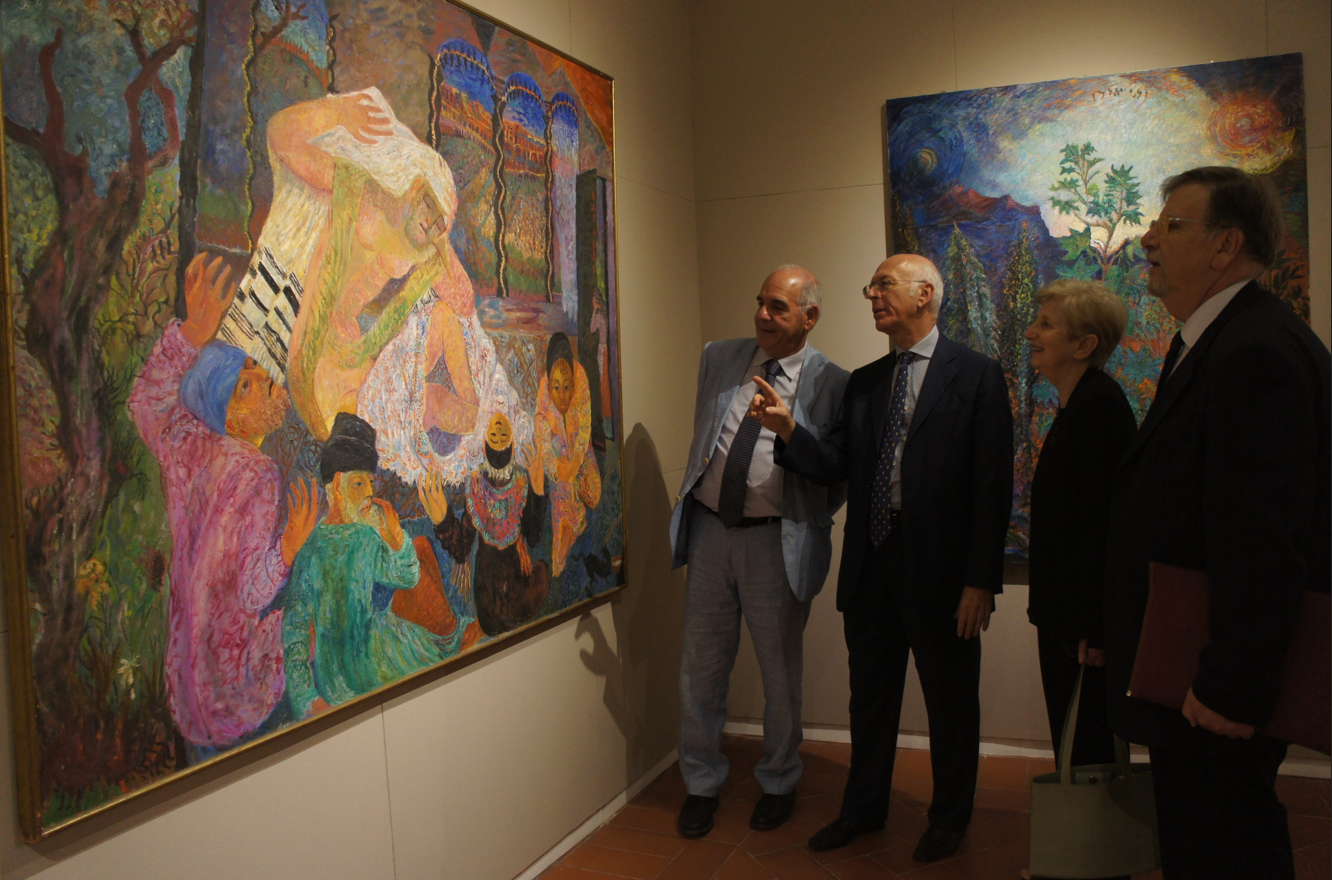
 |
| Italian Word of the Week: GIUSTO |
| by Daniela
Gross One word, many meanings. It is not easy to translate the term “giusto”. You could use “just, exact, right, correct, fair, equitable, righteous” and so on. But only the context can indicate the right significance (better, the proper nuance) and then the appropriate translation. In fact, the adjective “giusto” can be attributed to a person, a price, a wage, a judgment, a prize and also to the hour. If you like the music maybe you know it, because the expression “tempo giusto” (“right time” or “exact time”, the critics are still debating) is recurrent. And if you are interested in economics, you’re surely updated on the discussions about the relations between market and values. The Italian Jews associate the word “giusto”, written with the capital letter, mainly to the Righteous Among the Nations (we translate it as “Giusto fra le nazioni), the honor bestowed from Yad Vashem to non-Jews who during the Shoah risked their lives to save Jews from the persecutions of Nazis and Fascists. Less than one year ago that title was conferred to Gino Bartali, champion road cyclist, winner of the Giro d’Italia multi-stage race three times and twice of the Tour de France. Bartali, one the most popular athletes of his time, had been a courier for the Resistance and played an important role in the rescue of Jews. After the war he never spoke of his underground work. Hence many of his courageous endeavors remain unknown but finally the story came to the public opinion thanks to Pagine Ebraiche (as you can read in this release). Maybe the champion never talked about that because he felt that justice is a fundamental value from which we, as human beings, should never be less. And here we come back to the word of the week. The etymology of “giusto” is the Latin word (ius, iuris) that indicates the justice: if you recall it every translation becomes easier. www.cdec.it www.adl.com |






This newsletter is published under difficult conditions. The editors of this newsletter are Italian journalists whose native language is Italian. They are willing to offer their energy and their skills to give international readers the opportunity of learning more about the Italian Jewish world, its values, its culture and its traditions.
In spite of all our efforts to avoid this, readers may find an occasional language mistake. We count on your understanding and on your help and advice to correct these mistakes and improve our publication.
Pagine Ebraiche International Edition is published by the Union of Italian Jewish Communities (UCEI). UCEI publications encourage an understanding of the Jewish world and the debate within it. The articles and opinions published by Pagine Ebraiche International Edition, unless expressly stated otherwise, cannot be interpreted as the official position of UCEI, but only as the self-expression of the people who sign them, offering their comments to UCEI publications. Readers who are interested in making their own contribution should email us at desk@ucei.it
You received this newsletter because you authorized UCEI to contact you. If you would like to remove your email address from our list, or if you would like to subscribe using a new email address, please send a blank email to desk@ucei.it stating "unsubscribe" or "subscribe" in the subject field.
© UCEI - All rights reserved - The articles may only be reproduced after obtaining the written permission of the editor-in-chief. Pagine Ebraiche - Reg Rome Court 199/2009 – Editor in Chief: Guido Vitale - Managing Editor: Daniela Gross.
Special thanks to: Giorgio Albertini, Francesco Moises Bassano, Susanna Barki, Monica Bizzio, Benedetta Guetta, Daniel Leisawitz, Gadi Luzzatto Voghera, Yaakov Mascetti, Francesca Matalon, Anna Momigliano, Giovanni Montenero, Elèna Mortara, Lisa Palmieri Billig, Shirley Piperno, Giandomenico Pozzi, Daniel Reichel, Adam Smulevich, Simone Somekh, Rossella Tercatin, Ada Treves.
Questo notiziario è realizzato in condizioni di particolare difficoltà. I redattori di questo notiziario sono giornalisti italiani di madrelingua italiana. Mettono a disposizione le loro energie e le loro competenze per raccontare in lingua inglese l'ebraismo italiano, i suoi valori, la sua cultura e i suoi valori. Nonostante il nostro impegno il lettore potrebbe trovare errori e imperfezioni nell'utilizzo del linguaggio che faremo del nostro meglio per evitare. Contiamo sulla vostra comprensione e soprattutto sul vostro aiuto e sul vostro consiglio per correggere gli errori e migliorare.
Pagine Ebraiche International Edition è una pubblicazione edita dall'Unione delle Comunità Ebraiche Italiane. L'UCEI sviluppa mezzi di comunicazione che incoraggiano la conoscenza e il confronto delle realtà ebraiche. Gli articoli e i commenti pubblicati, a meno che non sia espressamente indicato il contrario, non possono essere intesi come una presa di posizione ufficiale, ma solo come la autonoma espressione delle persone che li firmano e che si sono rese gratuitamente disponibili. Gli utenti che fossero interessati a offrire un proprio contributo possono rivolgersi all'indirizzo desk@ucei.it
Avete ricevuto questo messaggio perché avete trasmesso a Ucei l'autorizzazione a comunicare con voi. Se non desiderate ricevere ulteriori comunicazioni o se volete comunicare un nuovo indirizzo email, scrivete a: desk@ucei.it indicando nell'oggetto del messaggio "cancella" o "modifica".
© UCEI - Tutti i diritti riservati - I testi possono essere riprodotti solo dopo aver ottenuto l'autorizzazione scritta della Direzione. Pagine Ebraiche International Edition - notiziario dell'ebraismo italiano - Reg. Tribunale di Roma 199/2009 - direttore responsabile: Guido Vitale - Coordinamento: Daniela Gross.
Realizzato con il contributo di: Giorgio Albertini, Francesco Moises Bassano, Susanna Barki, Monica Bizzio, Benedetta Guetta, Daniel Leisawitz, Gadi Luzzatto Voghera, Yaakov Mascetti, Francesca Matalon, Anna Momigliano, Giovanni Montenero, Elèna Mortara, Lisa Palmieri Billig, Shirley Piperno, Giandomenico Pozzi, Daniel Reichel, Adam Smulevich, Simone Somekh, Rossella Tercatin, Ada Treves.






